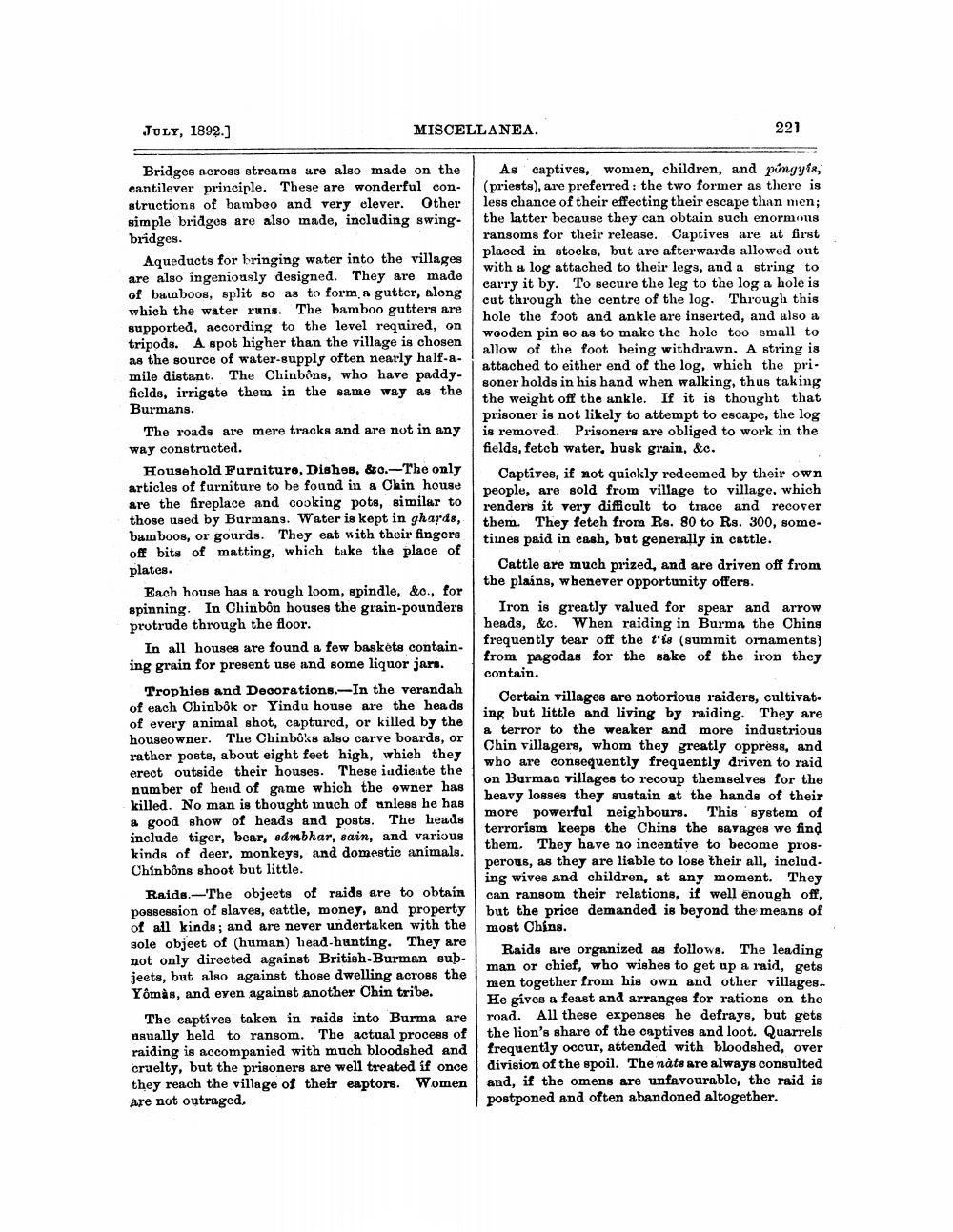________________
JULY, 1892.)
MISCELLANEA.
221
Bridges across streams are also made on the eantilever principle. These are wonderful constructions of bamboo and very clever. Other simple bridges are also made, including swing. bridges.
Aqueducts for bringing water into the villages are also ingeniously designed. They are made of bamboos, split so as to form a gutter, along which the water runs. The bamboo gutters are supported, according to the level required, on tripods. A spot higher than the village is chosen as the source of water-supply often nearly half-amile distant. The Chinbôns, who have paddyfields, irrigate them in the same way as the Burmans.
The roads are mere tracks and are not in any way constructed.
Household Furniture, Dishes, &0.-The only articles of furniture to be found in a Chin house are the fireplace and cooking pote, similar to those used by Barmans. Water is kept in ghards, bain boos, or gourds. They eat with their fingers off bits of matting, which take the place of plates.
Each house has a rough loom, spindle, &o., for spinning. In Chinbôn houses the grain-pounders protrude through the floor.
In all houses are found a few baskets containing grain for present use and some liquor jars.
Trophies and Decorations. In the verandah of each Obinbôk or Yindu house are the heads of every animal shot, captured, or killed by the houseowner. The Chinboks also carve boards, or rather posts, about eight feet high, which they erect outside their houses. These iudieate the number of hend of game which the owner has killed. No man is thought much of unless he has a good show of heads and posts. The heads include tiger, bear, sdnbhar, sain, and various kinds of deer, monkeys, and domestic animals. Chinbôns shoot but little.
Raids.---'The objects of raids are to obtain possession of slaves, eattle, money, and property of all kinds; and are never undertaken with the sole objeet of human) head-hunting. They are not only directed against British-Burman subjeets, but also against those dwelling across the Yomàs, and even against another Chin tribe.
The eaptíves taken in raids into Burma are usually held to ransom. The actual process of raiding is accompanied with much bloodshed and cruelty, but the prisoners are well treated if once they reach the village of their eaptors. Women are not outraged.
As captives, women, children, and púngyís, (priests), are preferred: the two former as there is less chance of their effecting their escape than men; the latter because they can obtain such enormous ransoms for their release. Captives are at first placed in stocks, but are afterwards allowed out with a log attached to their legs, and a string to carry it by. To secure the leg to the log a hole is cut through the centre of the log. Through this hole the foot and ankle are inserted, and also a wooden pin so as to make the hole too small to allow of the foot being withdrawn. A string is attached to either end of the log, which the pri. soner holds in his hand when walking, thus taking the weight off the ankle. If it is thought that prisoner is not likely to attempt to escape, the log is removed. Prisoners are obliged to work in the fields, fetch water, husk grain, &c.
Captives, if not quickly redeemed by their own people, are sold from village to village, which renders it very difficult to trace and recover them. They fetch from Rs. 80 to Rs. 300, sometines paid in eash, bat generally in cattle.
Cattle are much prized, and are driven off from the plains, whenever opportunity offers.
Iron is greatly valued for spear and arrow heads, &c. When raiding in Burma the Ching frequently tear off the t'ís (summit ornaments) from pagodas for the sake of the iron they contain.
Certain villages are notorious raiders, cultivating but little and living by raiding. They are a terror to the weaker and more industrious Chin villagers, whom they greatly oppress, and who are consequently frequently driven to raid on Burmaa villages to recoup themselves for the heavy losses they sustain at the hands of their more powerful neighbours. This system of terrorism keeps the Chins the savages we find them. They have no incentive to become prosperous, as they are liable to lose their all, including wives and children, at any moment. They can ransom their relations, if well enough off, but the price demanded is beyond the means of most Chíns.
Raids are organized as follows. The leading man or chief, who wishes to get up a raid, gets men together from his own and other villages. He gives a feast and arranges for rations on the road. All these expenses he defrays, but gets the lion's share of the captives and loot. Quarrels frequently occur, attended with bloodshed, over division of the spoil. The nats are always consulted and, if the omens are unfavourable, the raid is postponed and often abandoned altogether.




